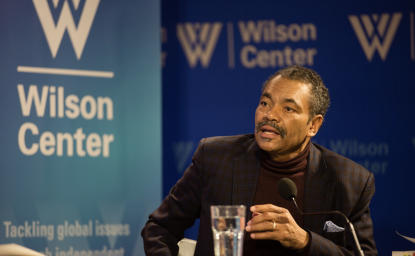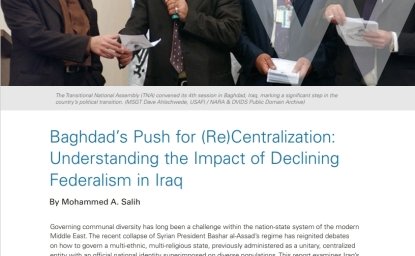231. Constructing Threat in Russian Foreign Policy: Ethnicity, Apocalypse, and Baltic Warriors

John Ikenberry's important new book, After Victory, contends that victorious states seek stable alliances and cooperative relations after major wars. Rather than using military victory to assert further dominance, the urge for stability should trump triumphalism.
Ikenberry's thesis faces an important challenge in contemporary world order, however, given a tendency already evident in the two American administrations since the Cold War for bold unilateral action (or action only marginally credible as multinational). Does the Cold War's distinctive lack of military engagement between the dominant powers - and therefore lack of the death and destruction that humble victor and vanquished alike - mean that today's victors are likely to be more assertive, and the rest more unstable?
Less attention has been paid to the other side of the coin, what can happen "after loss." For the Russian Federation, the end of the Cold War meant loss of empire, loss of global advantage, loss of identity, and loss of well-being. Also coming into play is the Russian perception of American unilateralism. The Yeltsin administration steered a consistently pro-Western course in foreign policy and trade relations, with occasional short-lived demonstrations of defiance. The pro-Western orientation was in particular, pro-American. Current foreign policy analysts in Russia assess the costs of this strategy in terms of major losses. Despite vigorous Russian opposition, including that of former Soviet President Mikhail Gorbachev, the United States spearheaded the decision to expand the North Atlantic Treaty Organization (NATO) to include Poland, Hungary, and the Czech Republic. And over thunderous opposition from Russia, including widespread anti-western protest in the country, NATO, at American urging, initiated and continued the bombing of Kosovo and Serbia in 1999. The fact that Russia ultimately cooperated with NATO in calming the region owed a great deal to Yeltsin's personal commitments to the Clinton administration.
During the stressful 1990s, a relatively low-cost outlet for Russian frustration about perceived Western belligerence took the form of threat regarding the rights of cultural Russians in the Baltic states. This is not to say that the issue was, or is, purely an instrumental one. The issue is important precisely because there is tremendous cultural resonance and resentment in Russia regarding the Baltic states, both because of historical differences and because of their current status as the "success stories" of the post-Soviet experience. At a time of great fear about the weakening of Slavic countries, during the 1990s, Estonia, Latvia and Lithuania were safer targets for criticism than their more powerful western neighbors. In addition, Yeltsin's credibility in the Baltics left him some room to manoever. Even Baltic leaders who resented clumsy overtures by the Yeltsin administration to include their countries in a Russian "security umbrella" recalled Yeltsin's personal bravery in 1991 when he supported Baltic independence.
A clue to Russia's current post-Cold War foreing policy direction is provided by the ways in which current Russian President Vladimir Putin's decision-making in this area contrasts with foreign policy under the Yeltsin administration. For instance, Putin has kept up a frenetic pace as president, making frequent foreign trips with a particular focus on the Soviet Union's traditional allies and also travelling extensively within Russia. The message is that this is a president in command of his faculties and of the country, coupled with a determination to re-assert Russia's role in the international community. Closer relations with Iran and Cuba, certain to displease the United States, are presented as a pragmatic effort to take advantage of ties established in the Soviet era with countries that are still potential trade partners.
Putin has had a burden in governing more familiar under the tsarist regime than the Communist one: he had to be careful about blaming his predecessor for the situation he inherited, given that the office came to him as a result of Yeltsin's patronage. However, in an important interview on foreign policy given to the newspaper Izvestiia on March 22, 2001, Putin criticized several key decisions of the Yeltsin era. First, he said that the assumption of all debts of the Soviet Union was a "serious error." Further, in direct contrast to Yeltsin's western and especially American orientation, Putin asserted: "The CIS (Commonwealth of Independent States) is at the top of the list of our foreign policy priorities, precisely because there are 25 million people there who consider Russia their second Motherland and Russian their native tongue."
Putin then turned to the Baltic states and reasserted a Russian role in the region, insisting upon "an observance of legitimate rights and interests" of cultural Russians there. Having delivered the hammer blow, he then added, "On the other hand, it will not help ethnic Russians in these countries if we choose the path of confrontation. Such problems should be solved through dialogue."
Putin's popularity is based in part on what is perceived as his reassertion of Russia's standing in the world - initially through the claim that he would settle troubles in Chechnya, and then through the steadily re-establishment of Russia's leading role vis-a-vis her neighbors to the south and southwest, which is a popular cause at home. After a decade of embarrassment in foreign policy at Yeltsin's hands, Putin emphasizes Russian pride and importance.
A key aspect of foreign policy strategy in the Putin administration has been the expansion of national security interests to include concerns more conventionally understood as domestic. In particular, Putin, unlike Yeltsin, has highlighted Russia's demographic crisis and portrayed it as a security threat. Many industrialized countries would have zero population growth or less without immigration, but Russia is dealing with a mortality crisis not seen outside of full-scale wartime in modern history. Life expectancy for men and women has fallen drastically in the last ten years, for men to less than 60 years of age. In his public remarks, Putin dwells not on the causes of this crisis - alcoholism and related accidents are prime contributors - but rather on the dangers of a low birth rate for Russia.
In keeping with the domestic made international issues, Putin also insists upon language rights for Russian speakers outside Russia as a foreign policy concern, an area in which Putin's attention pre-dates his presidency. The issue of citizenship and language rights in the Baltic states offer Russians a compelling example of a perceived assault on Slavic cultural norms, in some minds (and newspaper columns) a foreshadowing of the bombing campaign in the former Yugoslavia and of continued tension between east and west.
These policy priorities receive considerable force from the social and state-level perceptions of Baltic, and especially Estonian, opposition to Russia's interests. In 1996, for example, a poll of the Russian public showed that Estonia was considered to be Russia's greatest enemy. In a State Department survey taken in the year 2000, Russian respondents characterized relations with Estonia as Russia's most difficult (ahead of the United States and China). Russia's most deadly challenge to her sovereignty - the war in Chechnya - has repeatedly raised images of a sort of "imagined conflict" with the Baltic states. In both Chechen wars, rumors concerning a Baltic threat swirled from the front to Russian cities. In the first conflict, 1994-96, "Baltic women warriors" were said to be opposing Russian forces in Chechnya, and since 1999, rumor has it that Balts in Russian uniforms joined the Chechen forces. At issue here is not the truth or falsehood of these rumors, which would be difficult to verify, but the evident weight given to fears about Baltic opposition even when more obvious foes have taken the battlefield.
Relations between cultural Russians and the titular nationalities in Estonia and Latvia, and between Lithuania and Kaliningrad on her western border, still occasion strong rhetoric from Russia, especially when language laws are enforced. Lithuania has had the most constructive relationship with Russia since 1991, in part because the small percentage of cultural Russians residing in Lithuania made an all-inclusive citizenship politically less complicated. And since 1998, Lithuania has taken a very active role in shaping constructive relations with the Kaliningrad region. Estonia and Latvia have faced considerable tension in their relations with Russia and in their dealings with the then respective one-third and nearly one-half non-titular populations they inherited after independence. Today, government and the public in both countries acknowledge that the cultural Russians who remain are there to stay. The international community has played an important role in brokering workable citizenship and language arrangements, in some instances meaning that enforcing the strict letter of language laws is better postponed. Tension between national groups is far lower in 2001 than it was in the initial post- independence period. Although resentment lingers, the chances for a prosperous and healthy life for cultural Russians in the Baltic states is much higher than in Russia.
Returning to Ikenberry's thesis, it remains to be seen if engagement between perceived winners and losers after the long peace takes on constructive lines as in more typical post-war periods. The post-Soviet period provides a test as to whether the means of socially tolerated threat construction in key countries can still allow for positive engagement. This is as much a challenge for American foreign policy as it is for Russian foreign policy, given the temptation of belligerence at a time when the costs of assertive behavior are real but less readily apparent.
Martha Merritt spoke at an EES Discussion on March 28, 2001. The above is a summary of her presentation. Meeting Report #231.
Author
Assistant Professor of Political Science, University of Notre Dame, IN

Global Europe Program
The Global Europe Program is focused on Europe’s capabilities, and how it engages on critical global issues. We investigate European approaches to critical global issues. We examine Europe’s relations with Russia and Eurasia, China and the Indo-Pacific, the Middle East and Africa. Our initiatives include “Ukraine in Europe”—an examination of what it will take to make Ukraine’s European future a reality. But we also examine the role of NATO, the European Union and the OSCE, Europe’s energy security, transatlantic trade disputes, and challenges to democracy. The Global Europe Program’s staff, scholars-in-residence, and Global Fellows participate in seminars, policy study groups, and international conferences to provide analytical recommendations to policy makers and the media. Read more

Explore More
Browse Insights & Analysis
Dr. Maurice Jackson: The Sounds of Resistance Throughout History


